英文版中国新年介绍
介绍中国春节的英语作文(精选3篇)
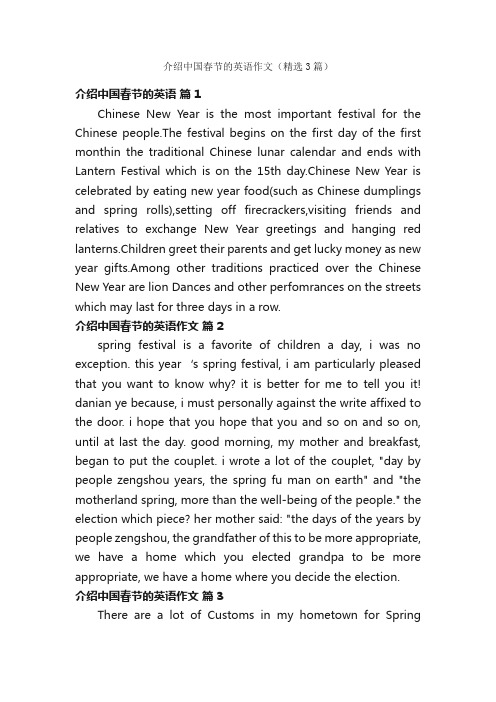
介绍中国春节的英语作文(精选3篇)介绍中国春节的英语篇1Chinese New Year is the most important festival for the Chinese people.The festival begins on the first day of the first monthin the traditional Chinese lunar calendar and ends with Lantern Festival which is on the 15th day.Chinese New Year is celebrated by eating new year food(such as Chinese dumplings and spring rolls),setting off firecrackers,visiting friends and relatives to exchange New Year greetings and hanging red lanterns.Children greet their parents and get lucky money as new year gifts.Among other traditions practiced over the Chinese New Year are lion Dances and other perfomrances on the streets which may last for three days in a row.介绍中国春节的英语作文篇2spring festival is a favorite of children a day, i was no exception. this year‘s spring festival, i am particularly pleased that you want to know why? it is better for me to tell you it! danian ye because, i must personally against the write affixed to the door. i hope that you hope that you and so on and so on, until at last the day. good morning, my mother and breakfast, began to put the couplet. i wrote a lot of the couplet, "day by people zengshou years, the spring fu man on earth" and "the motherland spring, more than the well-being of the people." the election which piece? her mother said: "the days of the years by people zengshou, the grandfather of this to be more appropriate, we have a home which you elected grandpa to be more appropriate, we have a home where you decide the election.介绍中国春节的英语作文篇3There are a lot of Customs in my hometown for SpringFestival. I dont believe you!In the Spring Festival, both men and women and young men and women wear beautiful new clothes, with simple smiles on their faces to welcome the coming of the new year. Red red couplets and New Year pictures were posted in each family. All drums. The children go to the new year and send the cards. At night, everywhere decorated. Famous shops, to hang out hundreds of lights, lantern, lamp, whats ice, shadeng...... Every kind of。
给外国人介绍中国春节的英语作文
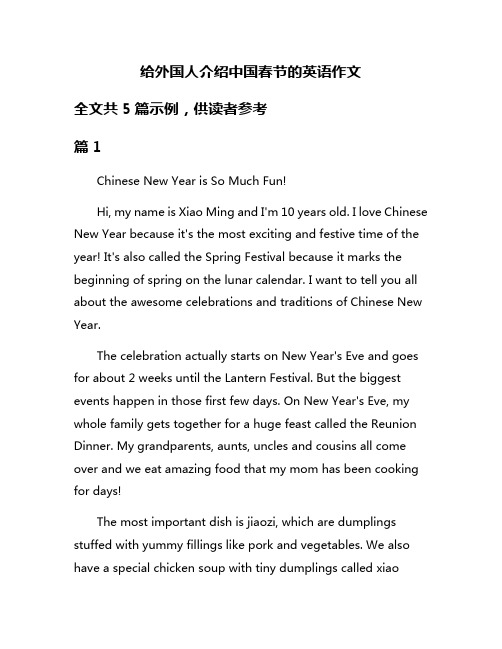
给外国人介绍中国春节的英语作文全文共5篇示例,供读者参考篇1Chinese New Year is So Much Fun!Hi, my name is Xiao Ming and I'm 10 years old. I love Chinese New Year because it's the most exciting and festive time of the year! It's also called the Spring Festival because it marks the beginning of spring on the lunar calendar. I want to tell you all about the awesome celebrations and traditions of Chinese New Year.The celebration actually starts on New Year's Eve and goes for about 2 weeks until the Lantern Festival. But the biggest events happen in those first few days. On New Year's Eve, my whole family gets together for a huge feast called the Reunion Dinner. My grandparents, aunts, uncles and cousins all come over and we eat amazing food that my mom has been cooking for days!The most important dish is jiaozi, which are dumplings stuffed with yummy fillings like pork and vegetables. We also have a special chicken soup with tiny dumplings called xiaohuntun. And there is always a whole steamed fish because the chinese word for fish (yu) sounds like the word for surplus or extra. So the fish symbolizes having more than enough for the new year.After dinner, my cousins and I get really excited because it's almost time for fireworks and firecrackers! We run outside with our sparklers and snaps while the adults set off the big, loud fireworks displays to scare off evil spirits and bad luck. The night sky lights up with bright reds, greens, and golds - it's so beautiful! We aren't allowed to set off the big fireworks but we can do the smaller handheld ones with our parents' help.Another fun tradition is staying up late to watch the New Year's Gala show on TV. It has singing, dancing, comedy skits, and magic performances that everybody watches together. When midnight hits, we yell "Guo Nian Hao!" which means "Celebrate the New Year!" then we can open our red envelope presents filled with "lucky money" from our parents and grandparents. The smallest ones only have a few kuai (yuan), but I got 300 kuai because I'm one of the older grandkids now. Yay!The next couple weeks are filled with more festivities and customs. We hang up red lanterns and decorations with auspicious sayings like "Fortune" and "Happiness." Red is a verylucky color in China. On the second day, we get haircuts to renew ourselves for the new year. On the third day, we don't sweep or take out garbage because it could "sweep away" the good luck and wealth that just came into the home.My favorite part is wearing brand new clothes and shoes from my red hongbao envelopes! During the first week, kids like me aren't supposed to take baths because we might wash away our newfound luck and prosperity. Also no hair-cutting or using sharp objects like scissors or knives because that's considered unlucky. But it's ok, I can wait a week to get all cleaned up!Another tradition that's really fun is giving out more red envelopes with crisp new bills inside. My parents get them from work and we have to give them to friends, neighbors, service workers like postal carriers, hairstylists, etc. It's rude not to give them out because it symbolizes good luck and blessings in the new year.About two weeks after New Year's Day is the Lantern Festival, which is celebrated by eating sticky rice balls called tangyuan and watching beautiful lantern shows at night. People also solve brain teasers written on lanterns which is supposed to give your mind a workout for the new year. I love trying to untangle all the confusing riddles and puzzles!Well, those are the major customs and festivities of Chinese New Year. As you can see, it is filled with lucky symbols, ancient traditions, delicious food, spending time with loved ones, and of course lots of firecrackers and red envelopes with money! Chinese New Year is my most cherished holiday because it is so vibrant, auspicious, and fun. I hope you can experience the excitement of Chinese New Year celebrations for yourself one day. Gong Xi Fa Cai! (Congratulations and be prosperous!)篇2Chinese New Year is My Favorite Holiday!Hi! My name is Xiao Ming and I'm 10 years old. I go to Peking Elementary School in Beijing. Today I want to tell you all about my favorite holiday – Chinese New Year! It's also called the Spring Festival. Chinese New Year is the biggest and most important celebration in China. The whole country goes on vacation to spend time with family and have fun traditions.Chinese New Year happens sometime between January 21st and February 20th each year. The date changes based on the lunar calendar instead of the regular calendar. The new year starts with the first new moon of the new year. This year, Chinese New Year fell on January 22nd!Preparations Begin Weeks AheadDid you know families start getting ready for Chinese New Year over a month before it happens? It's true! There is so much to do to get ready.First, everybody does a super deep clean of their whole house. We clean every single corner to sweep away any bad luck from the old year. My least favorite job is scrubbing the floors!Next, we decorate our homes with bright red paper cutouts. Red is considered a lucky color in China. The cutouts have words like "Happiness" and "Wealth" on them. We also hang up red lanterns and put up poems on the walls. My grandma is an amazing calligrapher so she writes the poems for us.Then it's time to prepare lots of yummy food for our big reunion dinner on New Year's Eve. My mom spends days cooking her secret dumplings and spring rolls recipes. My favorite part is taste testing them!Finally, kids get lucky money in little red envelopes from their parents and grandparents. I look forward to my red envelopes every year! I always try to spend my lucky money on new toys and games.New Year's Eve FunOn the night before Chinese New Year, we gather together for a huge reunion dinner with all our family members. My aunt, uncle, and cousins come over to my grandparents' house. The table is piled high with all our favorite foods like whole steamed fish, long noodles for a long life, dumplings, and sticky rice cakes. After dinner, the kids get to stay up super late! We watch the amazing New Year's TV specials that have singing, dancing, comedy shows, and more.At midnight, we light tons of firecrackers and fireworks for good luck in the new year. The firecrackers are SO loud! It scares off any bad or evil spirits lurking around. Once the fireworks are done, it's officially the first day of the new year. Time to go to sleep so we can celebrate the next day!First Day CelebrationsI wake up early on the first day and dress up in my new clothes that my grandma got me as a New Year's gift. First thing, I have to say "xin nian kuai le" (Happy New Year) to all my elders like my parents and grandparents. It's extremely bad luck if you don't!For breakfast, we eat special rice ball soup and dumplings because they resemble wealth and prosperity. After breakfast, my cousins and I get our red envelopes filled with lucky moneyfrom our grandparents. We always try to be on our best behavior so we get more money!In the afternoon, my relatives give us kids lai see which are even more red envelopes with more lucky money! The whole first day of the new year is spent visiting with extended family, feasting on snacks like candies and seeds, and playing with whatever new toys we got.Two Weeks of CelebrationsThe celebrations don't stop after the first day though - Chinese New Year is 16 days long! Each day has a different tradition and meaning behind it.On the fifth day, we eat dumplings shaped like ingots which used to be currency made from gold and silver. My brother and I have contests to see who can eat the most! On the eighth day, families traditionally eat a special veggie dish with ingredients like bamboo shoots and mushrooms. According to legend, Buddha decided to become enlightened after being served this dish.My favorite day is the fifteenth and final day of Chinese New Year called the Lantern Festival. We go out and admire all the beautiful red lanterns hung up everywhere while eating tangyuan which are chewy rice balls. My grandparents tell us the story of the jade rabbit on the moon who grinds medicines for immortality.At night, we kids get to carry our own little lanterns and watch amazing fireworks light up the sky. Adults also solve clever riddles written on the lanterns. After two weeks of nonstop celebrating, eating, and family time, it's finally time for Chinese New Year to be over and for me to go back to school. Until next year!I hope you enjoyed learning about my favorite holiday! Chinese New Year is a really fun and special time for families in China. Maybe you can celebrate it with me next year. Xin Nian Kuai Le!篇3My Favorite Holiday - Chinese New Year!Hi there! My name is Xiaoming and I'm 10 years old. I live in Beijing, China with my mom, dad, and little sister Huanhuan. Today I want to tell you all about my absolute favorite holiday - Chinese New Year!Chinese New Year is the biggest and most important celebration in China. We have been celebrating it for over 4,000years! It happens sometime between January 21st and February 20th each year, based on the lunar calendar. The holiday actually lasts for 15 days, but we get a whole week off from school which is awesome!In the weeks leading up to New Year's Day, my family starts getting really excited and doing lots of preparations. My mom goes on a huge cleaning spree - she sweeps, mops, dusts everything to get rid of any bad luck from the old year. We also put up bright red decorations like lanterns, couplets with good luck sayings, and pictures of the new animal zodiac sign for that year.My dad usually gets us new clothes, shoes, and other gifts for the holiday too. We also make sure to get haircuts because you're not supposed to cut your hair during the New Year period or you'll cut off your luck for the coming year! On New Year's Eve, we always have a huge reunion dinner with all our relatives like grandparents, aunts, uncles and cousins. The meal is super important and has lucky foods like whole fish, dumplings, noodles and good fortune fruits.After our big feast, the real fun begins! My sister and I get giving lucky red envelopes with money inside from our aunts, uncles, grandparents and parents. We always try to stay up lateto watch the amazing New Year's TV shows and fireworks at midnight. The fireworks displays are incredible and seem to last for hours!When I wake up on New Year's Day, the first thing I do is wish my parents "Xin Nian Kuai Le" which means "Happy New Year" in Chinese. Then we get dressed in our new clothes and head over to the elders' houses to bai nian or wish them a happy new year too. We also give them our best wishes and thanks by performing a ceremony called "kow tow" where we kneel on the ground and bow our heads to show respect.For the next couple weeks of New Year celebrations, there are so many fun traditions and activities. We play fireworks and firecrackers almost every night to scare off evil spirits and bad luck. My family gives out more red envelopes with lucky money. On the 15th and final day, we go out for the Lantern Festival where there are incredible lantern exhibits, more fireworks, and lots of delicious snacks and treats.As you can see, Chinese New Year is a huge deal for my family and pretty much everybody in China. It's such an exciting and fun time filled with amazing food, fireworks, red envelopes with money, and tons of lucky traditions and superstitions. We get to spend quality time with loved ones while ringing in a newyear of luck, prosperity and happiness. That's why it's hands down my favorite holiday ever! I can't wait to celebrate it again next year.Thanks for reading about my favorite Chinese New Year holiday! I hope you can come experience it in China for yourself someday. Just remember to wear red for good luck and be ready for two weeks of non-stop festivities, food and fun! Xin Nian Kuai Le!篇4My Favorite Holiday: Chinese New Year!Hi there! My name is Xiaoming and I'm going to tell you all about my favorite holiday - Chinese New Year! It's the biggest and most important celebration in China. We call it "Chunjie" which means Spring Festival. It's a really exciting and fun time of year!Chinese New Year happens sometime between late January and mid-February. The exact date changes every year because it follows the lunar calendar. But it always falls on the first new moon of the new year. This year it was on January 22nd!There are lots of special traditions and activities we do to get ready for Chinese New Year. One of the biggest things is givingour homes a really good deep clean! We want to sweep away all the bad luck from the old year. My mom makes me clean my room from top to bottom. No dust bunnies allowed!We also decorate our homes with lots of red. Red is a lucky color in China. We hang up red lanterns, red scrolls with lucky symbols, and red couplets on our doors. It's so bright and festive!My grandma always gives me, my brother and sister little red envelopes filled with "lucky money". They have cute pictures of dogs or pigs or the zodiac animal for that year. I always feel so excited getting lucky money!A few days before New Year's Eve, we have a special family dinner called "nian ye fan". We make lots of delicious foods like dumplings, noodles, fish and sticky rice balls. Each food has a lucky meaning, like long noodles for long life. My favorite is tang yuan, the sticky rice balls. I can never get enough of those!When it's finally New Year's Eve, the whole family stays up late together. We watch a big TV show that comes on once a year and plays games and fun activities. At midnight, we light firecrackers and make as much noise as possible to scare away evil spirits!The next few days are my favorite part - NO SCHOOL! Yay! I get to sleep in late, then wake up and share warm sweet rice balls with my family. We watch more New Year shows, give gifts, and I get to play with all my new toys from my aunts and uncles.One thing I really look forward to is my dad's work gives out these cool little plastic windmills with the new zodiac animal printed on them. This year was the Year of the Rabbit, so I got a cute rabbit windmill! I love them.On the 15th day of the new year, we have the Lantern Festival. We go out and see amazing lantern displays all over the city. Some lanterns are so huge and bright! We also eat tang yuan again and try to solve riddles written on the lanterns.After the lantern festival, it's time for everyone to go back to school and work. But we keep up some New Year traditions a little longer, like not sweeping the floors so we don't sweep away our good luck!Chinese New Year is just the best time of year. I get spoiled with gifts, I eat my favorite foods, and I get to spend quality time with my whole family. We get to kick out the old year and start fresh. What's not to love?I hope you enjoyed learning about my favorite holiday! Maybe you can come visit China next year and experience it for yourself. Just be sure to wear something red for good luck!篇5My Favorite Holiday - Chinese New YearHi! My name is Xiaoming and I'm 10 years old. I live in Beijing, China with my mom, dad, and little sister Huamei. My favorite time of the year is Chinese New Year! It's the biggest and most important celebration in China. I'm going to tell you all about it.Chinese New Year isn't on the same day every year like Christmas or New Year's Day. It's based on the lunar calendar, so the date changes. But it's always sometime in late January or early February during the winter. This year it was on January22nd.Weeks before New Year's Day, my mom starts cleaning our whole house from top to bottom. She says it's to sweep away any bad luck from the old year and make room for good luck in the new year. I help out by cleaning my room and wiping down all the furniture.Once our house is sparkling clean, my mom decorates it with lots of cool stuff for New Year's. We hang up red lanterns and put up poems written on red paper. We also decorate with upside-down fu characters because fu means blessing or good fortune. Upside-down it means that blessing is arriving!Another fun decoration is the door couplets. These are pairs of lines written on red paper that get hung on both sides of our front door. My dad picked out some really pretty ones from the New Year's market about hope, prosperity, and happiness.My favorite part of the New Year's decorations are the window grilles though. My dad buys paper cut into cool designs of animals, flowers, or characters and we stick them onto the glass. It makes all the windows look so beautiful and festive!In the week leading up to New Year's Day, my mom starts cooking lots of delicious holiday foods like dumplings, noodles, fish, and New Year's cake. She buys bags of oranges and tangerines too because they are symbols of prosperity. I love helping her make the dumplings.On New Year's Eve, my whole family gathers for a huge feast with all our aunts, uncles, cousins, and grandparents. We have so many amazing dishes - my favorites are grandma's soup dumplings and Dad's Mom's classic Beijing hot pot. After dinner,my cousins and I get hung red envelopes filled with money from our parents for good luck. We're not allowed to open them until New Year's Day though!At midnight, we kids are allowed to stay up late and watch the amazing New Year's celebration on TV. The whole country stops to watch the big countdown to the new year in Beijing. When the clock strikes midnight, we cheer, hug, and set off firecrackers and fireworks outside to scare away evil spirits. It's so loud and exciting!New Year's Day is the biggest day of celebration. In the morning, we all get up early and dress up in our brand new clothes that we got for New Year's. The first thing I always do is open the lucky red envelope I got the night before. Then our whole extended family gets together again for a huge breakfast with dumplings, noodles, and other lucky foods.After breakfast, we take turns visiting the homes of our relatives and close friends. At each house, we pay respect to the elders by saying "kung hei fat choy" which means "wishing you prosperity" in Cantonese. They give us more lucky red envelopes and delicious snacks and candy.The rest of the New Year holiday, which lasts about two weeks, is a fun time to relax, visit friends, eat lots of food, andenjoy various festivities and performances. My favorite part is always the spectacular New Year's parade with incredible floats, dancing dragons, performers on stilts, and fireworks!I love Chinese New Year because it's a time for my whole family to come together and celebrate our traditions. We get to eat amazing food, get red envelopes, set off fireworks, and have a lot of fun. It's also a chance to start fresh and make wishes for good luck in the new year. I can't wait until next New Year's!。
给外国人介绍中国春节的英语作文
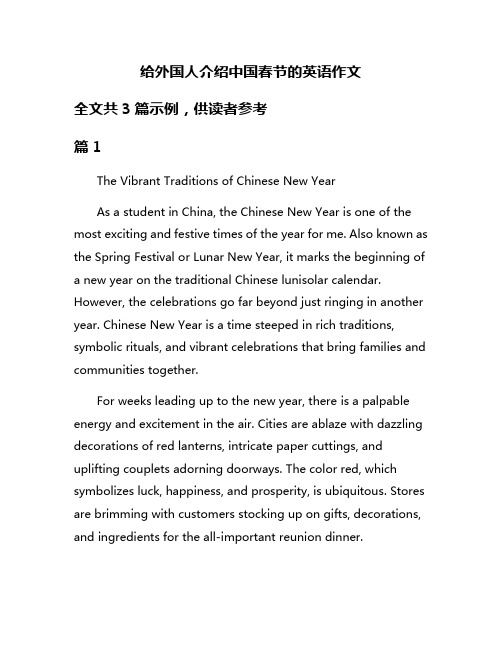
给外国人介绍中国春节的英语作文全文共3篇示例,供读者参考篇1The Vibrant Traditions of Chinese New YearAs a student in China, the Chinese New Year is one of the most exciting and festive times of the year for me. Also known as the Spring Festival or Lunar New Year, it marks the beginning of a new year on the traditional Chinese lunisolar calendar. However, the celebrations go far beyond just ringing in another year. Chinese New Year is a time steeped in rich traditions, symbolic rituals, and vibrant celebrations that bring families and communities together.For weeks leading up to the new year, there is a palpable energy and excitement in the air. Cities are ablaze with dazzling decorations of red lanterns, intricate paper cuttings, and uplifting couplets adorning doorways. The color red, which symbolizes luck, happiness, and prosperity, is ubiquitous. Stores are brimming with customers stocking up on gifts, decorations, and ingredients for the all-important reunion dinner.One of the most significant traditions is the annual deep cleaning of homes, which is believed to sweep away anyill-fortune and make way for incoming good luck. As a child, I always dreaded this chore, but now I understand its symbolic importance in starting the new year with a fresh slate.As the big day draws near, the real festivities begin. On New Year's Eve, families gather for the reunion dinner, which is undoubtedly the most important meal of the year. Aunts, uncles, cousins, and grandparents all convene around a lavish feast, enjoying dishes like dumplings, fish, and nian gao (a sticky rice cake), each with its own symbolic meaning. The dishes are prepared with the utmost care and attention to detail, as they are believed to bring good omens for the coming year.After the dinner, it's common for families to stay up late into the night, playing games, watching the iconic CCTV New Year's Gala, and awaiting the stroke of midnight. As the new year arrives, fireworks and firecrackers erupting in a kaleidoscope of colors and thunderous booms fill the night sky, meant to scare away evil spirits and welcome in good fortune.The next day, the real celebrations kick into high gear. Children receive red envelopes filled with money, known as "hongbao," from their elders as a symbol of luck and blessingsfor the new year. Families then embark on a whirlwind of visits to relatives and friends, exchanging well-wishes and indulging in more feasts and treats.One of my favorite traditions is the vibrant lion and dragon dances that take place in cities and towns across the country. Elaborate costumes and masks, accompanied by the rhythmic beating of drums and clashing of cymbals, create a dazzling spectacle as the lion and dragon "wake up" and bestow luck and prosperity on businesses and households.As the new year unfolds, the festivities continue with the Lantern Festival, which takes place on the 15th day of the lunar calendar. Elaborate lanterns of all shapes and sizes are hung, and families gather for another round of feasting and celebrations, often including the consumption of tang yuan (sweet rice balls) and the watching of spectacular lantern displays and parades.For me, the most special aspect of Chinese New Year is the opportunity to spend time with my extended family and reconnect with our cultural roots. As a student navigating the modern world, these traditions provide a grounding sense of identity and connection to my heritage.But Chinese New Year is not just about feasting and merrymaking – it's also a time for reflection and goal-setting. Asthe new year begins, it's customary to make resolutions and set intentions for the months ahead. Whether it's striving for academic excellence, personal growth, or contributing to society, the new year represents a fresh start and a chance to renew our commitments.As a student, I find the symbolism and rituals of Chinese New Year to be both fascinating and profound. From the deep-rooted traditions to the vibrant celebrations, every aspect is imbued with meaning and significance. It's a time to honor our ancestors, strengthen family bonds, and embrace the rich tapestry of Chinese culture.To my foreign friends and classmates, I would encourage you to experience the magic of Chinese New Year for yourselves. Immerse yourself in the sights, sounds, and flavors of this ancient festival. Attend local celebrations, try your hand at crafting intricate paper cuttings or lanterns, and don't be shy about participating in the lively traditions.But most importantly, take the time to understand the deeper meanings behind the festivities. Learn about the symbolism of the dishes served, the significance of the colors and decorations, and the ancient stories and myths that have shaped these traditions over thousands of years.Chinese New Year is not just a fleeting celebration, but a testament to the enduring spirit of a proud and resilient culture. As a student, it reminds me of the importance of preserving our heritage while also embracing progress and looking towards the future.So, as the lunar new year approaches once again, I invite you to join me in ushering in a year of prosperity, luck, and renewed hope. Let the thunderous drums, the vibrant colors, and the joyous laughter fill your heart with the spirit of togetherness and celebration that defines the Chinese New Year.篇2Discovering the Vibrant Traditions of Chinese New YearAs a student in China, one of the most exciting times of the year for me is the celebration of the Chinese New Year, also known as the Spring Festival. This ancient festival, deeply rooted in our rich cultural heritage, is a time of joyous reunions, colorful traditions, and a collective sense of renewal. Let me take you on a journey to unravel the fascinating customs and symbolism that make this festival truly unique.The Countdown and PreparationsWeeks before the New Year's Eve, the anticipation builds as families prepare for the grand festivities. Houses are meticulously cleaned, symbolizing the sweeping away of bad luck from the previous year. Red lanterns, adorned with intricate designs, are hung outside homes, believed to bring good fortune and happiness. The air is filled with the aroma of delectable dishes being prepared, as families gather to enjoy an extravagant reunion dinner on New Year's Eve.The Reunion and FeastingOn the eve of the new year, the streets come alive with the sound of firecrackers, traditionally lit to ward off evil spirits. Families reunite from near and far, embracing the opportunity to gather around the dinner table and savor the flavors of traditional delicacies. Dishes like dumplings, symbolizing wealth and prosperity, and whole fish, representing abundance and surplus, grace the table. The atmosphere is filled with laughter, stories, and the exchange of well-wishes for the coming year.Traditions and CustomsOne of the most cherished traditions is the giving of red envelopes, known as "hongbao," containing money. These are given by elders to children and unmarried individuals, signifying blessings and good luck for the new year. Another iconic ritual isthe hanging of upside-down Chinese calligraphy on doors, with the character "Fu" (福) representing fortune and happiness.For many families, the first few days of the new year are spent visiting relatives and friends, exchanging greetings and well-wishes. Children eagerly await the receiving of red envelopes, while adults engage in conversations about the year's prospects and aspirations.The Lantern FestivalAs the new year celebrations draw to a close, the Lantern Festival marks the final event of the Spring Festival period. Beautifully crafted lanterns, often in the shapes of animals or intricate designs, are displayed and paraded through the streets. Families gather to admire the glowing lanterns, enjoy tasty treats like tangyuan (sweet rice balls), and participate inriddle-guessing games. The warm glow of the lanterns symbolizes the brightness and hope of the new year ahead.Cultural Significance and TraditionsBeyond the festivities and customs, the Chinese New Year holds profound cultural significance. It is a time to honor our ancestors, pay respect to elders, and reinforce the values of family unity and filial piety. The intricate traditions and ritualsreflect the deep-rooted beliefs and philosophies that have shaped Chinese culture for millennia.As a student, I find great joy in participating in these age-old customs and sharing them with friends from around the world. The vibrant colors, delectable foods, and joyous atmosphere create an unforgettable experience that transcends cultural boundaries.Whether you're a visitor or a local, the Chinese New Year is a truly captivating celebration. It's a time when the entire nation comes together to bid farewell to the past year and embrace the new with open arms, carrying forward the rich tapestry of our cultural heritage. So, when the lunar new year rolls around, immerse yourself in the festivities, embrace the traditions, and experience the warmth and unity that this remarkable festival brings.篇3The Vibrant Celebration of Chinese New YearAs a student in China, one of the most exciting and colorful celebrations I look forward to every year is Chinese New Year. This ancient festival, also known as the Spring Festival, is a time of great joy, family reunions, and rich cultural traditions thathave been passed down for centuries. Let me take you on a journey through the wonder and significance of this beloved holiday.The Anticipation BuildsPreparations for Chinese New Year begin weeks in advance. Streets and homes are meticulously cleaned to sweep away any ill-fortune and make way for incoming good luck. Red decorations, symbolizing happiness and prosperity, adorn every corner, with lanterns, couplets, and paper cuttings creating a festive atmosphere. One of the most iconic symbols is the upside-down fu character, representing the arrival of luck and fortune.As the countdown begins, the air is filled with the aroma of delicious foods being prepared. Families gather to make dumplings, steam glutinous rice balls, and cook up a variety of mouthwatering dishes, each with its own symbolic meaning. For instance, fish is served as the Chinese word for it sounds like the word for "surplus," symbolizing abundance for the coming year.The Reunion DinnerOn Chinese New Year's Eve, the most important event takes place: the Reunion Dinner. This is a time when families, no matterhow far apart, come together to celebrate and strengthen their bonds. The table is laden with an array of dishes, each holding its own cultural significance.As we gather around the table, the elders offer their blessings and words of wisdom for the year ahead. The atmosphere is one of warmth, laughter, and gratitude for the opportunity to be together. We exchange red envelopes, known as hongbao, containing money as a symbol of good luck and prosperity.The Festivities BeginWhen the clock strikes midnight, the air erupts with the sound of firecrackers, believed to scare away evil spirits and welcome in the new year. Families stay up late into the night, playing games, watching traditional performances, and enjoying each other's company.The following days are filled with a whirlwind of activities and traditions. One of the highlights is the dragon and lion dances, where skilled performers bring these mythical creatures to life through elaborate costumes and energetic movements. The sounds of drums, cymbals, and gongs fill the streets, adding to the excitement.Another beloved tradition is the exchange of hongbao, where elders and married couples hand out red envelopes filled with money to children and unmarried individuals. This act symbolizes the transfer of good fortune and blessings for the new year.The Importance of FamilyAt the heart of Chinese New Year is the emphasis on family. This festival is a time for loved ones to reconnect, strengthen their bonds, and create cherished memories. For many, it is the only time of the year when distant relatives can gather under one roof, sharing stories, laughter, and the warmth of togetherness.As a student, I cherish these moments with my family. Amid the hustle and bustle of academic life, Chinese New Year reminds me of the importance of my roots and the love and support of those closest to me.Cultural Traditions and SuperstitionsChinese New Year is also a time when ancient traditions and superstitions come to life. For instance, it is believed that wearing new clothes symbolizes a fresh start, while sweeping or cleaning during the first few days of the new year is taboo, as it might sweep away the incoming good luck.Additionally, certain foods hold significant meaning. Whole fish and chickens are served to represent completeness and unity, while long noodles symbolize longevity. Even the shapes of certain dishes, like dumplings resembling ancient Chinese ingots, carry auspicious symbolism.The Colors and SymbolsThe vibrant colors and symbols associated with Chinese New Year are deeply rooted in cultural beliefs and traditions. Red, the predominant color, is believed to ward off evil spirits and bring good luck. It is seen everywhere, from decorations to clothing and hongbao.Other symbols, such as the character fu (福) meaning "fortune," the Chinese lion, and the mythical creature Nian, hold their own unique stories and meanings. These symbols are not just decorative elements but representations of the rich cultural heritage and beliefs that have been passed down through generations.A Time for Reflection and RenewalAmidst the joyous celebrations, Chinese New Year is also a time for reflection and renewal. As the old year fades away, we take stock of our accomplishments, challenges, and aspirationsfor the future. It is a time to let go of the past and embrace the opportunities that lie ahead.For many, the new year represents a fresh start, a chance to set new goals, and to strive for personal growth and success. It is a time to cultivate positive energy, strengthen relationships, and look forward to the possibilities that the new year holds.ConclusionChinese New Year is a celebration that transcends borders and cultures. Its vibrant traditions, rich symbolism, and emphasis on family and togetherness have captivated people around the world. As a student in China, I am grateful to be immersed in this incredible festival, witnessing firsthand the joy, unity, and cultural richness it brings.While the festivities may last for a few weeks, the spirit of Chinese New Year resonates throughout the year, reminding us to cherish our loved ones, embrace our cultural heritage, and approach each new day with hope, gratitude, and a commitment to personal growth.So, as the firecrackers echo in the distance and the lanterns cast their warm glow, I invite you to join me in celebrating thisbeautiful and vibrant festival, and to experience the wonder and magic of Chinese New Year.。
中国新年介绍英语作文
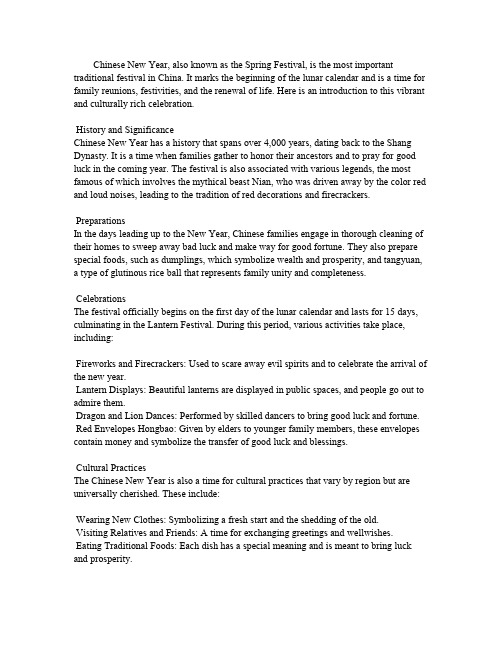
Chinese New Year,also known as the Spring Festival,is the most important traditional festival in China.It marks the beginning of the lunar calendar and is a time for family reunions,festivities,and the renewal of life.Here is an introduction to this vibrant and culturally rich celebration.History and SignificanceChinese New Year has a history that spans over4,000years,dating back to the Shang Dynasty.It is a time when families gather to honor their ancestors and to pray for good luck in the coming year.The festival is also associated with various legends,the most famous of which involves the mythical beast Nian,who was driven away by the color red and loud noises,leading to the tradition of red decorations and firecrackers.PreparationsIn the days leading up to the New Year,Chinese families engage in thorough cleaning of their homes to sweep away bad luck and make way for good fortune.They also prepare special foods,such as dumplings,which symbolize wealth and prosperity,and tangyuan, a type of glutinous rice ball that represents family unity and completeness.CelebrationsThe festival officially begins on the first day of the lunar calendar and lasts for15days, culminating in the Lantern Festival.During this period,various activities take place, including:Fireworks and Firecrackers:Used to scare away evil spirits and to celebrate the arrival of the new year.Lantern Displays:Beautiful lanterns are displayed in public spaces,and people go out to admire them.Dragon and Lion Dances:Performed by skilled dancers to bring good luck and fortune. Red Envelopes Hongbao:Given by elders to younger family members,these envelopes contain money and symbolize the transfer of good luck and blessings.Cultural PracticesThe Chinese New Year is also a time for cultural practices that vary by region but are universally cherished.These include:Wearing New Clothes:Symbolizing a fresh start and the shedding of the old. Visiting Relatives and Friends:A time for exchanging greetings and wellwishes. Eating Traditional Foods:Each dish has a special meaning and is meant to bring luck and prosperity.Zodiac AnimalsEach year in the Chinese zodiac is associated with an animal,and2023is the Year of the Rabbit.People born in the Year of the Rabbit are believed to be gentle,quick,and alert. The zodiac cycle repeats every12years,and each animal is thought to influence the personality and fortune of those born in its year.ConclusionChinese New Year is a time of joy,reflection,and hope.It is a celebration that is deeply rooted in Chinese culture and continues to be a significant event in the lives of many people around the world.Whether you are in China or elsewhere,the spirit of the Spring Festival is one of unity,renewal,and the anticipation of a prosperous year ahead.。
用英语介绍春节10句话
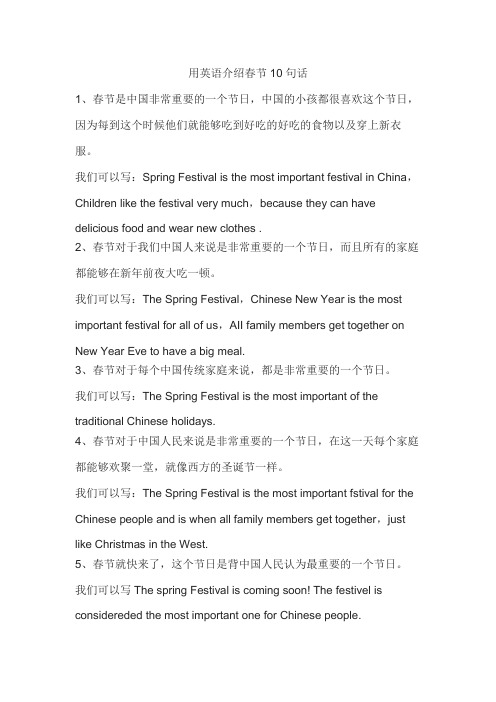
用英语介绍春节10句话1、春节是中国非常重要的一个节日,中国的小孩都很喜欢这个节日,因为每到这个时候他们就能够吃到好吃的好吃的食物以及穿上新衣服。
我们可以写:Spring Festival is the most important festival in China,Children like the festival very much,because they can have delicious food and wear new clothes .2、春节对于我们中国人来说是非常重要的一个节日,而且所有的家庭都能够在新年前夜大吃一顿。
我们可以写:The Spring Festival,Chinese New Year is the most important festival for all of us,AII family members get together on New Year Eve to have a big meal.3、春节对于每个中国传统家庭来说,都是非常重要的一个节日。
我们可以写:The Spring Festival is the most important of the traditional Chinese holidays.4、春节对于中国人民来说是非常重要的一个节日,在这一天每个家庭都能够欢聚一堂,就像西方的圣诞节一样。
我们可以写:The Spring Festival is the most important fstival for the Chinese people and is when all family members get together,just like Christmas in the West.5、春节就快来了,这个节日是背中国人民认为最重要的一个节日。
我们可以写The spring Festival is coming soon! The festivel is considereded the most important one for Chinese people.6.the lunar new year is a great occasion to the chinese people. it lasts about the first four days of the year,during which people do not work except for the workers on duty. students do not go to school,and shops are closed. 农历新年是一个伟大的时刻对中华民族来说。
介绍中国春节的英语作文(优秀5篇)
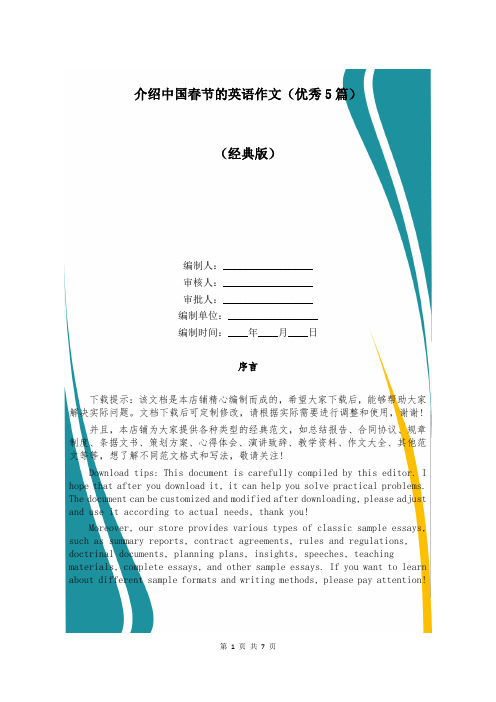
介绍中国春节的英语作文(优秀5篇)(经典版)编制人:__________________审核人:__________________审批人:__________________编制单位:__________________编制时间:____年____月____日序言下载提示:该文档是本店铺精心编制而成的,希望大家下载后,能够帮助大家解决实际问题。
文档下载后可定制修改,请根据实际需要进行调整和使用,谢谢!并且,本店铺为大家提供各种类型的经典范文,如总结报告、合同协议、规章制度、条据文书、策划方案、心得体会、演讲致辞、教学资料、作文大全、其他范文等等,想了解不同范文格式和写法,敬请关注!Download tips: This document is carefully compiled by this editor. I hope that after you download it, it can help you solve practical problems. The document can be customized and modified after downloading, please adjust and use it according to actual needs, thank you!Moreover, our store provides various types of classic sample essays, such as summary reports, contract agreements, rules and regulations, doctrinal documents, planning plans, insights, speeches, teaching materials, complete essays, and other sample essays. If you want to learn about different sample formats and writing methods, please pay attention!介绍中国春节的英语作文(优秀5篇)春节庆祝活动通常持续15天。
介绍中国春节的英文
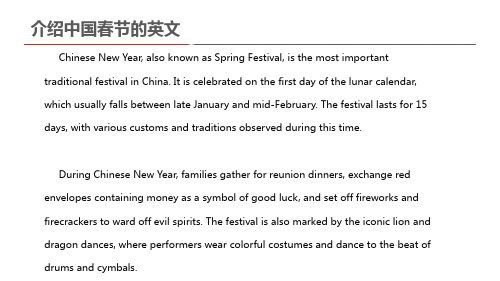
During Chinese New Year, families gather for reunion dinners, exchange red envelopes containing money as a symbol of good luck, and set off fireworks and firecrackers to ward off evil spirits. The festival is also marked by the iconic lion and dragon dances, where performers wear colorful costumes and dance to the beat of drums and cymbals.
Chinese New Year is a time of joy, celebration, and renewal. It is a time for family gatherings, feasting on traditional delicacies, and exchanging well wishes for the year ahead. It is a cherished cultural tradition that highlights the importance of family, good fortune, and unity in Chinese society.
介绍中国春节的英文
Homes are decorated with red lanterns and paper cuttings featuring auspicious symbols and phrases. People clean their houses thoroughly to sweep away bad luck and make room for good fortune in the coming year. The festival is also a time for paying respects to ancestors and visiting temples to pray for blessings.
The Spring Festival春节介绍(中英文版)
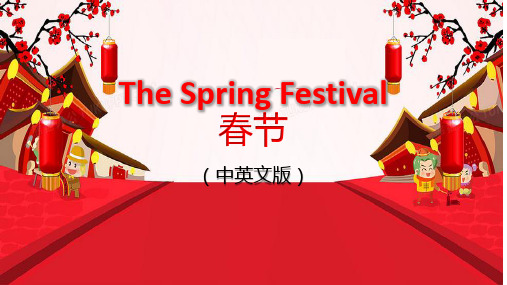
Custom
除夕之夜,全家团聚在一起 吃年夜饭,万家灯火通明,围坐 炉旁闲聊,通宵守夜,象征着团 圆,期待着新的一年吉祥如意。
On New Year's Eve, the whole family gathers together to have a New Year's Eve dinner, with all the lights on. They sit around the fireplace chatting and stay up all night, symbolizing reunion and looking forward to a prosperous new year.
The Spring Festival 春节
(中英文版)
目录
1
Origin
2
Time
3
Significance
4
Custom
春节即中国农历新年,俗称新春、新岁、岁旦等。
The Spring Festival is the Chinese Lunar New Year, commonly known as the new year, the new year, the new year's day and so on.
Origin
据记载,中国人过春节已有4 千多年的历史,它是由虞舜兴起的。
According to records, the Chinese people have celebrated the Spring Festival for more than 4000 years. It was raised by Yu Shun.
Significance
春节是我国民族的传统节日,是 中华民族文化的绘萃。
